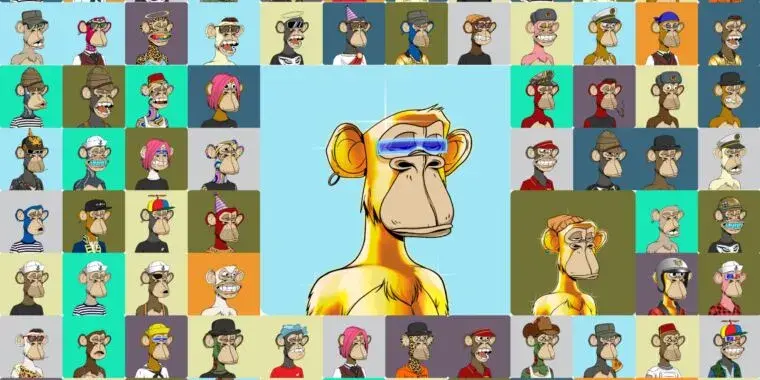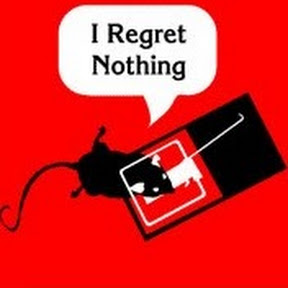Archived version: https://archive.ph/9WPwx
The Sotheby’s auction house has been named as a defendant in a lawsuit filed by investors who regret buying Bored Ape Yacht Club NFTs that sold for highly inflated prices during the NFT craze in 2021. A Sotheby’s auction duped investors by giving the Bored Ape NFTs “an air of legitimacy… to generate investors’ interest and hype around the Bored Ape brand,” the class-action lawsuit claims.
The boost to Bored Ape NFT prices provided by the auction “was rooted in deception,” said the lawsuit filed in US District Court for the Central District of California. It wasn’t revealed at the time of the auction that the buyer was the now-disgraced FTX, the lawsuit said.
“Sotheby’s representations that the undisclosed buyer was a ‘traditional’ collector had misleadingly created the impression that the market for BAYC NFTs had crossed over to a mainstream audience,” the lawsuit claimed. Lawsuit plaintiffs say that harmed investors bought the NFTs “with a reasonable expectation of profit from owning them.”
Sotheby’s sold a lot of 101 Bored Ape NFTs for $24.4 million at its “Ape In!” auction in September 2021, well above the pre-auction estimates of $12 million to $18 million. That’s an average price of over $241,000, but Bored Ape NFTs now sell for a floor price of about $50,000 worth of ether cryptocrurrency, according to CoinGecko data accessed today.
Investors previously sued Bored Ape creator Yuga Labs, four company executives, and various celebrity promoters including Paris Hilton, Gwyneth Paltrow, Kevin Hart, Snoop Dogg, Serena Williams, Madonna, Jimmy Fallon, Steph Curry, and Justin Bieber. The original class-action was filed in December 2022, and Sotheby’s was added as a defendant in an amended complaint submitted on August 4.
Yuga describes its collection of 10,000 Bored Ape NFTs as “unique digital collectibles living on the Ethereum blockchain” that double as a “Yacht Club membership card.” The website has some “members-only” areas. “When you buy a Bored Ape, you’re not simply buying an avatar or a provably rare piece of art,” the NFT collection’s website says. “You are gaining membership access to a club whose benefits and offerings will increase over time. Your Bored Ape can serve as your digital identity, and open digital doors for you.”
Lawsuit: Yuga “colluded” with Sotheby’s
The amended lawsuit alleges that “Yuga colluded with fine arts broker, Defendant Sotheby’s, to run a deceptive auction.” After the sale, a Sotheby’s representative described the winning bidder during a Twitter Spaces event as a “traditional” collector, the lawsuit said.
The lawsuit said it turned out the auction buyer was now-bankrupt crypto exchange FTX, whose founder Sam Bankman-Fried is in jail awaiting trial on criminal charges. Ethereum blockchain transaction data shows that after the auction, “Sotheby’s transferred the lot of BAYC NFTs to wallet address 0xf8e0C93Fd48B4C34A4194d3AF436b13032E641F3,77 which, upon information and belief, is owned/controlled by FTX,” the complaint said. Speculation that FTX was the buyer had been percolating since at least January 2023.
The lawsuit alleges that Yuga Labs and Sotheby’s violated the California Unfair Competition Law, the California Corporate Securities Law, the US Securities Exchange Act, and the California Corporations Code. The plaintiffs also claim that Sotheby’s Metaverse, an NFT trading platform opened after the auction, “operated (or attempted to operate) as an unregistered broker of securities.”
“FTX has several deep ties to Yuga such that it would be mutually beneficial for both Yuga and FTX (as well as Sotheby’s) if the BAYC NFT collection were to rise in price and trading volume activity. Upon information and belief, given the extensive financial interests shared by Yuga, Sotheby’s and FTX, each knew that FTX was the real buyer of the lot of BAYC NFTs at the Sotheby’s auction at the time that Sotheby’s representatives were publicly representing that a ‘traditional’ buyer had made the purchase,” the lawsuit said. FTX is not named as a defendant.
Ape prices soared, then plummeted
After the auction, the price of Bored Ape digital assets hit a new high and kept rising for months. It peaked at over $420,000 in April 2022 but plummeted to about $90,000 six weeks later, according to CoinGecko.
The class action lawsuit’s named plaintiffs are Johnny Johnson, Ezra Boekweg, Mario Palombini, and Adam Titcher. They are trying to get certification of a class consisting of “all investors who purchased Yuga’s non-fungible tokens (‘NFTs’) or ApeCoin tokens (‘ApeCoin’) between April 23, 2021 and the present.” There were over 103,000 account holders of Yuga securities as of December 1, 2022, the lawsuit said.
“While the Executive Defendants made hundreds of millions of dollars, investors were left with NFTs worth a fraction of their artificially inflated value,” the original version of the complaint in December said.
Yuga and other defendants have a September 12 deadline to file motions to dismiss the complaint. Sotheby’s told CNN this week that the “allegations in this suit are baseless, and Sotheby’s is prepared to vigorously defend itself.” Yuga Labs similarly called the allegations “completely without merit or factual basis.”
Even I could have told you that a vague digital “proof of ownership” of a hideous, mass-produced ape image was a bad investment.
“proof of ownership” of a bookmark that just happens to currently be decorated by “a hideous, mass-produced ape image” (well at least as long as the image server stays up)
(well at least as long as the image server stays up)
On the bright side, most of these GIFs are stored on IPFS, so anyone can keep a copy even after the original server goes down. Wonder how many of these NFT owners know about doing that, though… but since the GIFs themselves are relatively, chances are people will keep them preserved for posterity as part of archival project, a reminder of “the NFT craze of the 2020s”.
Which, BTW, is why their value is never going to fall to $0; I’d buy one for $0.01 right now, just “for the lulz”. I bet someone would do it for $10 or more.
It’s the “Honey! We now own a star!” of the 21st century
You can still buy a star. Not sure if the “parcel on the Moon” sellers have closed shop already, or new international treaties are going to wipe the slate clean and start from scratch (at least before the first Moon war).
I had a couple buddies that got swept up in that craze, dumping thousands and expecting to be millionaires. I kept telling them they were buying a link to an image, and that there is no way it’ll hold value over the long term and that the entire premise is flawed. It was met with, “you have no idea what you’re talking about” or, “you don’t understand how this works.”
Now I ask them how their NFT “portfolios” are performing, and am met with thousand yard stares and a grumbled “fuck you.”
Yeah I mean honestly this is not surprising in the least
I seriously doubt these people would be suing if their “investments” had gone up in value. They speculated and they lost; claiming Sotheby’s misled them seems absurd when millions of people were shouting from the rooftops that ugly JPEGs are worth nothing regardless of how much math is done to them.
It seems to be saying that only the purchaser was speculating but the seller was essentially selling things ‘to themselves’ (or to someone closely related who knew what was going on) to try and create the illusion of an actual market existing?
Unless you’re doing it with stocks or physical goods I don’t think that’s even illegal.
NFTs are unregulated that was what all of the crypto bros get wittering on about. The flip side of that of course is that NFTs are unregulated and dodgy people dodgy stuff.
Don’t want dodgy stuff to happen, well don’t invest in unregulated nonsense.
They’re alleging collusion and a scam, not lack of regulation. Those are “regulated” on their own, in the penal code.
They kind of are. It’s not the governments job to manage NFTs
That’s the whole point
Um… what?
Based on the article, it seems more like the seller conspired with FTX, a company based around cryptocurrency, to make a huge sale far above the “expected auction price”. The legitimate complaints about this are that the buyer wasn’t disclosed as being FTX, and that both the buyer and seller both stood to gain from the sale, as it gave an illusion of a market where someone could make profit, and not just a scam
Listen, I get that we’re collectively enjoying the schaudenfreude of watching the poor mooks who bought into this trend suffer the consequences of their actions. But why defend con artists? These are people who seek out and prey on said mooks, taking advantage of addiction and poor impulse control to make millions, all while contributing nothing to society. They did lie, cheat and steal their way to millions, and no one “deserves” to be on the losing end of that.
Idiots with money will literally always exist. Assholes offering no value to the world will always try to abuse them. The law is supposed to step in and do its best to force said assholes to play by rules that force them to be productive. Let’s not turn up our nose at the one time it might serve it’s purpose, just so we can feel smug and superior.
I hope this case finds its way through the courts, and I hope it costs these con artists millions.
They’re all con artists. The people buying them were trying to scam someone else.
They’re not victims they 100% knew what they were doing. They’re just suing because they happen to be the ones unlucky enough to be left holding the bag.
But they all knew that something like this was inevitable, but since they all have main character energy they assumed that they’d be fine and this would happen to someone else. Frankly they can go swing.
Exactly this. I struggle to have much sympathy for the people who bought into this scam but I have no sympathy at all for the scammers and I hope they pay. Society doesn’t need more of these people.
Person who loses a game of musical chairs, sues the guy who rented out the room.
Art auctions are a scam, just some more so than others.
Not only that. It’s also a means of long-term tax evasion, by storing works of art in a freeport.
Some are just a long con.
I think my one regret about the NFT fad is that as an artist, I didn’t take the opportunity to sell some crap doodles to some rich assholes. Not that I’d have made millions or anything, but a couple thousand would have been nice, and the rich assholes did seem to be buying anything and everything put in front of them.
It wouldn’t have been ethical to sell stuff I knew was worthless to people with more money than functioning brain cells, but the temptation was definitely there. Is exploiting the idiocy of exploiters unethical?
deleted by creator
Unfortunately there were plenty of people who weren’t rich but wasted what little money they had thinking an NFT was their golden ticket. The only right move here was to not play, so you did good.
Yep. I’m poor, but at least my ethics are intact. I do feel that as I get older, when I look at stuff like crypto, NFTs, and now AI, a part of me goes “am I disgusted by this because it’s unethical bullshit that enriches a minority at the expense of everyone else… or am I just turning into my dad and being suspicious of new things?”
TBH, unless you got extraordinarily lucky (or had the right connections to get somebody to push your NFTs) you probably would have wound up losing money. “Gas” fees on the Etherium blockchain can get really high, and I found this article that has some really good numbers on median prices for NFT sales. For the time period their data came from (a random week during the NFT gold rush) about %30 of artists sold for prices low enough that they were likely to barely break even or possibly lose money on fees. Virtually no artists made any appreciable money on NFTs even during the biggest hype periods.
Accidentally deleted my own comment instead of editing it, here we go again.
Especially because our parents always had reasons they cited for their suspicion of the New Thing. Am I picking up on valid concerns and I’m right to be concerned about crypto, NFTs, and AI, or am I eating up conspiracy trash about how talking on a cellphone will significantly increase my chances of having a brain tumor? I think I’ve got valid concerns, but to be fair so did our parents.
deleted by creator
“am I disgusted by this because it’s unethical bullshit that enriches a minority at the expense of everyone else… or am I just turning into my dad and being suspicious of new things?”
Depends on how suspicious you get, and how much you learn about the actual thing before making a decision.
Every new thing, from trading shells for fish, to trading USD for GIFs, was new at some point, and someone (a con man) convinced others that it was worth a ton more than it really was. You can look at every new discovery, every new technology, and you will find someone using it to con others; don’t even get me started on love potions, radium suppositories, or quantum shields for cellphones.
Crypto, NFTs, AI, all have their grifters, and will keep having them for as long people don’t learn how the stuff works… which is when grifters will jump onto the next thing. And yes, grifters are an unethical minority who will spew bullshit about anything to enrisg themselves at the expense of others.
That doesn’t mean these things don’t have value: herbal potions are the precursor to modern medicines, radiation is used both in bombs and in the radiography I got done this morning, quantum effects are used in the transistors of the cellphone I’m writing this from. Crypto is a great value transfer mechanism, NFTs and smart contracts are a great invention to avoid company lock-in, AI is the best thing since swipe keyboards on a touch screen.
As you grow up, you should grow wary of stuff you don’t understand, you should also try to understand new stuff so you can spot what’s an actual legitimate use that can benefit you.
To me it’s important to ask “what problem is it solving”, and “how did we solve that problem in the past”, and “what does it cost”.
Crypto currency solves the problem of spending being tracked by a third party. We used to handle this by giving each other paper. The new way involves more time, and a stupendous amount of wasted electricity.
Nfts solve the problem of owning a digital asset. We used to solve this by writing down who owned it. The cost is a longer time investment, and a stupendous amount of wasted electricity.
Generative AI is solving the problem of creative content being hard to produce, and expensive. We used to solve this problem by paying people to make things for us, and not making things if you don’t have money. The cost is pissing off creatives.The first two feel like cases where the previous solution wasn’t really bad, and so the cost isn’t worth it.
The generative AI case feels mixed, because pissing off creatives to make more profit feels shitty, but lowering barriers to entry to creativity doesn’t.
Crypto:
- Solves the problem of money being represented by a number on a centralized bank’s computer, controlled by said bank.
- For a long time already, most money has never been, and will never be, printed or even written down onto paper.
- The new proof protocols don’t waste all that energy anymore either.
NFTs:
- Solve the problem of getting a “public digital proof” of owning an asset.
- We still use notaries to do that offline, and are VERY SLOWLY being enhanced with government backed digital signatures.
- The cost is orders of magnitude lower than keeping a notary running (look into that if you don’t believe me).
deleted by creator
Exploiting people is the American way. Seriously.
When you buy a Bored Ape, you’re not simply buying an avatar or a provably rare piece of art, you are gaining membership access to a club whose benefits and offerings will increase over time. Your Bored Ape can serve as your digital identity, and open digital doors for you.
Excuse me, I’m going to go vomit and then drink kerosene.
I recommend vomiting a second time after that.
I am not a doctor, but I do sometime play one on the Interwebs.
Do you have an NFT of your credentials?
I only accept authentic Beanie Baby credentials
In Spanish we have an expression, “¡No se podía saber!” It’s something like “Who could have seen it coming?”
NFTs are a bad investment? ¡No se podía saber!
I’m partial to “Who’da thunk that was gonna happen?”
Thank you for posting the article text on Beehaw! :)
Wow there was absolutely no way anyone could have even guessed at this possibility.
Action, meet consequence
What kind of brain dead idiot did you have to be to think they would be in the first place ?
Celebrities apparently.
HAHAHAHAHAHA 😂
Oh no! 😂
They all could have sold when they were worth something but they were greedy and wanted more. Sorry but someone has to hold the bag.
There is an argument to be had that they could never be sold for the prices they were bought for.
and they were still worthless then too
Thats true that they were “worthless” but at the time people were buying and trading them so the owners could have sold them for a bit of profit or a bit of loss.





















